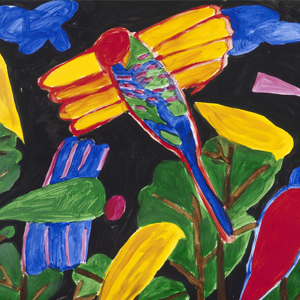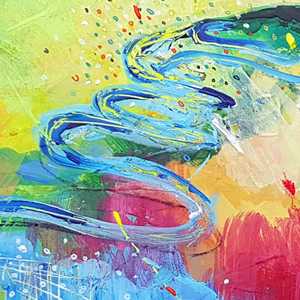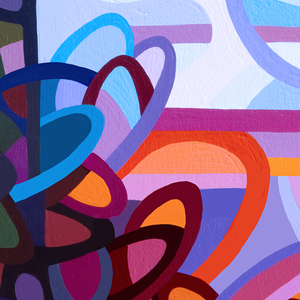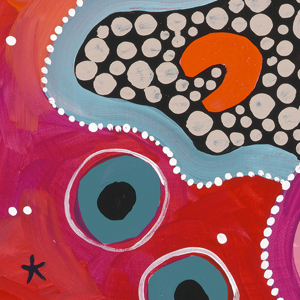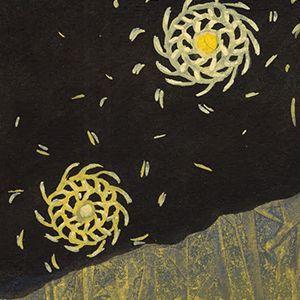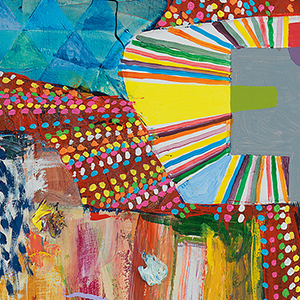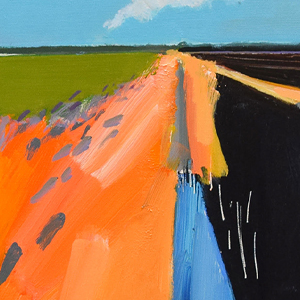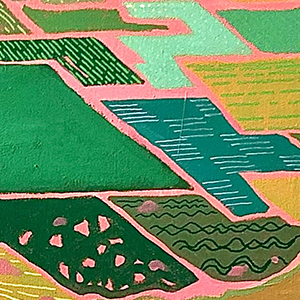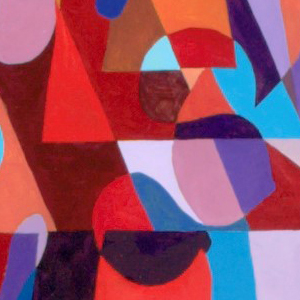
PURSUING Vocation | Good Medicine
Seeking Wisdom
Purpose and the TurboCharged Life
James and Margaret Plews-Ogan
Artwork: “Slow” by Christopher Noxon © 2021
On December 2, 2021, our lives cracked open. Jim was diagnosed with ALS, Amyotrophic Lateral Sclerosis. ALS is often referred to as the one illness that a physician most fears. It is a rapidly progressive neuromuscular disease that eventually results in complete paralysis, robbing the patient of the ability to move, speak, swallow, and eventually breathe, while leaving the patient’s cognitive capacity intact. ALS is 100% fatal. No one has ever survived. The average life expectancy after diagnosis is 2–3 years. One hundred years after the diagnosis was made famous by baseball legend Lou Gehrig, only a few minimally effective treatments exist, these aimed only to slow the course.
When given this diagnosis, patients commonly hear: “go home, hug your loved ones and get your affairs in order,” or “now’s the time to tackle that bucket list, and eat all the chocolate ice cream you want.”
At the time of the diagnosis, we were both busy clinician-scholars. Our lives were full and engaging, with meaningful work, close family, and a community of friends. We were runners, and loved camping, hiking, and exploring the world. We were activists, focusing on improving the care of vulnerable populations. With this diagnosis, our lives were completely upended.1
What is it that characterizes a life-changing event? We use language like “upended” or “cracked open,” appropriately referencing an earthquake, an event in which the ground literally opens underneath, shifts dramatically, causing structures to collapse. A defining element to such an event is that our way of understanding ourselves, and our place in the world, collapses. Our purpose collapses. If my purpose in life is to be a good mother and my only child dies, how do I go on? The transformational question that is posed by such a circumstance is “why am I here on this earth? Who am I now that I am in this circumstance in which I can no longer be as I was before?” Moving forward, in a transformational way, requires a radical reconstruction of purpose.
For many years, the scientific community focused only on the negative effects of trauma. Post-traumatic stress disorder became a household term. Only more recently have we discovered that positive transformation can and does occur in the wake of severe life-changing events. The phenomenon of post traumatic growth, first characterized by Tedeshi and Calhoun,2 has been well documented. Research has shown that people can report having more compassion, a greater appreciation for life, and a better understanding of the deeper meaning and purpose in their life. It has been postulated that the ultimate positive outcome of these transformational events is wisdom-gained, essentially becoming a better, more compassionate person in the wake of these events. In our wisdom in medicine study,3 we interviewed physicians and patients who were coping with serious life challenges. Our study participants were specifically selected because they themselves felt that in the wake of tragedy they had grown stronger and changed for the better. We were interested in understanding more about the process of moving through tough circumstances in a way that resulted, ultimately, in growth, in wisdom-gained. Our study participants described five elements that were important in this process: acceptance, stepping in, integration, new narrative, and wisdom.
Purpose was a central theme that ran through each of these elements. Transformative growth and wisdom-gained through adversity necessarily involved the struggle to reshape a new understanding of themselves, the world, and their place in it, redefining their purpose in order to continue to lead a meaningful life.
Acceptance
One of the study groups included physicians who had made a serious medical error. Making a serious medical error has long been an action physicians most fear, and can lead many to quit medicine, and even to suicide. But some have been able to move through an event like this and become better doctors. For these physicians, the process of growth began with a brutally honest acknowledgement of their mistake, without excuse or shifting of responsibility. It meant a clear-eyed acceptance that they could, and did, make a serious mistake, cutting adrift their notion of themselves as a “good doctor.”
Regarding our ALS diagnosis, when we say “our lives were cracked open,” we are in that moment accepting that life has changed so radically that the way we previously understood ourselves and the world, our purpose, is shattered. This radical acceptance, this willingness to be adrift, is critical to opening the space for a rebuilding. To be, even temporarily, without purpose, is to be open to the transformational questions, “Who am I now? Why am I on this earth?” ALS is a disease that robs a person of almost everything that we might consider essential to our lives—the ability to move, to communicate, to eat and drink, and even to breathe. Viktor Frankl, having survived the Nazi concentration camps, famously writes, “everything we have can be taken from us but one thing, the last of our human freedoms, to choose one’s attitude in any given circumstance.”4 It seems that by “attitude” Frankl is really talking about purpose, about the ability to choose how one is going to “be” in the world under even the most terrible and limiting of circumstances. Accepting the devastating breadth of particulars in this reality of ALS is almost impossible in the abstract. Allowing ourselves to be adrift for a moment, to ask ourselves “what does this mean for our lives,” to talk about it with our children, is the opening up of the space in which we reexamine who we are, and who we are called to be in this circumstance.
Stepping In
Stepping in to meet adversity head on is an active choice to engage with the new reality, with the intent of moving directly toward it. It is the opposite of avoidance. Engagement with the new reality may be a single step, but more often it is an iterative process that continues as the new reality unfolds.
For the physicians in the wisdom in medicine study, stepping in meant disclosing the mistake in an honest and forthright way to the patient and family. This was not easy. Stepping into adversity of this magnitude required intention, courage, and humility.
In the case of ALS, stepping in often begins with disclosing the diagnosis to loved ones. One by one the story is retold and the reality is experienced anew. Offering next steps helps the listener, while serving to cement the path forward for the one telling the story. Stepping in for us in ALS land also meant: exploring the medical literature for a deeper understanding of the illness, arranging second opinions, exploring options for clinical trials, closing a busy solo pediatric practice, and retiring from an academic appointment. Each of these required a new bit of acceptance, a renewed decision to step in and move forward with patience and resilience.
Stepping in also includes engaging in the process of examining one’s purpose. Who am I in this new reality? Sometimes, the new reality requires a complete restructuring of purpose. Jim is a well-known pediatrician and beloved figure in the community. On simple trips to the grocery store, we invariably encounter those who express their delight and their gratitude for having been his patients. With ALS, Jim can no longer function as a pediatrician. His purpose of caring for patients as their pediatrician no longer fits. But purpose sometimes runs deeper than the particular circumstance, and requires modification or refocusing, but not necessarily a complete restructuring. Advocacy, for example, has long been a defining purpose for Jim. Following the earthquake of ALS, how can purpose be reshaped given our new opportunities and limitations?
I Am ALS (IAA) is a new patient/family-run advocacy organization founded by Brian Wallach and Sandra Abrevaya, both former Obama White House staffers. IAA empowers people affected by ALS to use their talents, their experience, and their story to create positive change. Well-organized and supported volunteer committees work strategically to enact legislation and policy at the federal level. New volunteers are welcomed and offered the opportunity to have an immediate impact. Stepping in with IAA provides the chance to become part of a movement to change the course of ALS. In I Am ALS we have found our kin. We have found people who could help us to refocus our deepest purpose—to make the world a better place—informed by our new reality of who we are now and what we can do.
Integration
In the wisdom in medicine study, the element of integration was the most complex. For the physicians, it meant integrating their mistakes into a new understanding of themselves as doctors. They must ask questions such as, “How can I be a doctor when I know that I can make a mistake?, How do I integrate this very real awareness of my own fallibility with my notion of a ‘good’ doctor?, How does this change me and the way I understand myself?”
Life with ALS changes everything. Many patients diagnosed with ALS are athletes or military personnel, with a self understanding that generally includes a strong and capable body, as well as a high level of independence and self-reliance. As the disease progresses and disability ensues, daily challenges become the norm. Rudiments of hygiene, feeding, mobility, communication, and the coordination of clinical care absorb ever increasing amounts of the day, and integrating these limitations into one’s self concept is a severe challenge.
The clinical course of ALS is routinely tracked using a validated 12-item scale known as the ALS-FRS-R (Figure 1).5 With each clinic or research visit, the ALS- FRS-R is used to generate a numeric score documenting the progressive decline in function. Graphing the numeric score over time can provide an estimate of the rate of decline, and thus be used to predict a rough estimate of time remaining. At each clinic visit, the patient’s decline is carefully documented.
Life with ALS, it would seem, is a life measured solely by its decline. In this scenario, hope naturally becomes a hope for a slower decline.
Integrating ALS into a rich, purpose-filled life takes more than hoping for a plateau of decline. Living a purposeful life requires more than reactively adapting to the ever-present obstacles of disability.
Since being welcomed into a new kinship of the ALS community, primarily with IAA, it has been plain to see an abundance of purpose-filled lives. Many of the same virtues honed by those who bravely face ALS head on are now being used to generate growth and refine purpose. The virtues (courage, endurance, compassion, perseverance, trustworthiness) are used to create new legislation, to raise funds for research and better care, to generate new possibilities for mobility and communication, to make the world a better place, if not for themselves, then for others who will follow them. In their actions, people living with ALS, and those who care for and about them, embody the markers of post traumatic growth and the attributes of wisdom. Why, we have wondered, isn’t this being measured, documented, recognized, even facilitated, by the healthcare community?
What if we began tracking ALS with a companion scale that documents progressive growth? What if we claimed that a new purpose, call it Turbocharged Living, might coincide with the clinical course of ALS. Let’s call this the ALS-TLS, Turbocharged Living Scale (Figure 2).6
A heightened appreciation for kindness seems an obvious potential by-product of living with ALS. Humor is still humor when it is the dark humor emerging amidst moments of absurdity. Discovering new capacity for innovation while adapting to the obstacles of disability might easily translate to innovation in other parts of an active, purposeful life. This flip side of the grief and devastation of a disease like ALS does not necessarily come naturally, and is easily overwhelmed by the degree of loss each day. But with intention, practice, and the help of others, this flip side can help balance the journey—actively seeking beauty, engaging in gratitude practices daily, setting aside time for contemplation, receiving the kindness and love of community, finding ways to make the world better, and letting the absolute absurdity of trying to cope with this disease generate both tears and laughter. All of these practices allow us to integrate grief honestly, to deepen and refine our purpose, and to have a sustaining hope.
New Narrative
Redefining purpose and integrating the practice of using virtue to buoy adversity are the foundations for building a new narrative. The question “who am I now” has an answer: “This is me now, this is how I am in the world, these are the actions that exemplify it.”
For the physicians in the wisdom in medicine study, the new narrative was what a “good but imperfect doctor” looked like. For many, it meant functioning in a more team-based way, or limiting the number of patients they were responsible for, so they could give their full attention to each person. They became more willing to ask for help, to talk about and teach the reality of human limitations and vulnerability to mistakes.
What does a new narrative look like in the world of ALS?
ALS is by definition a series of losses, each with their own grief. In our new narrative, our new story of living with ALS, grief must coexist with a desire to live a turbocharged life. Actively choosing to practice virtues like compassion, curiosity, courage, and gratitude help to make grief more buoyant so that it does not drown out new growth and purpose. The virtues help us to sustain the coexistence of grief and growth. Also, a practice of buoying grief creates an opportunity for loss to inform purpose.
Our new narrative has included creating The Hummingbird Fund,7 a small foundation we established to facilitate our new purpose in the face of ALS. The Fund has three guiding principles—closing care gaps, accelerating research, and leveraging opportunities for advocacy—each of which serve to engage others in the process of stepping in. The work of the Fund has created a mechanism for us to live out our deeper purpose of making the world a better place.
If you think of it, transformational change in the world generally begins with individuals who have been transformed by adversity, and are driven by a deep hope that change is possible. Change is hard, but those transformed by suffering have a purpose that is stronger and deeper than the inertia that resists change. The courage and strength exemplified by those who choose to respond to adversity with new purpose inspires others. Living a turbo-charged life is living a life filled with deep, life-sustaining hope. Living a turbo-charged life means being aware of and surrounded by compassion and gratitude, humor, and beauty. It is a self-sustaining circle.
Choosing Wisdom
ALS is a catastrophic illness that imposes relentless challenges and losses to daily life, with a steady stream of grief. Living with ALS does not necessarily mean being defined by ALS. Seeking wisdom, seeking to live a good life in the face of great challenges, involves everyday choices. Henri Nouwen puts it this way; “For every time there are losses, there are choices to be made. You choose to live your losses as passages to anger, blame, hatred, depression and resentment, or you choose to let these losses be passages to something new, something wider and deeper.”8
Holding the reality of ALS, including its devastation, together with the continued practice of noticing beauty and kindness, fostering curiosity and gratitude, allows each to inform and infuse the other. Hope that is generated from this kind of wisdom-generating life is more than inspiring. This kind of deep hope generates life-sustaining purpose. It is not dependent on results, or on resolution of the true uncertainty that permeates life. It is the kind of hope that Jonathan Wilson-Hartgrove talked about: “Our hope isn’t that we have the power to change anyone or any system, but rather that we can live here and now in the way of truth.”9
Seeking wisdom, living a turbo-charged life in the face of adversity, also involves letting go of the striving for answers, and instead falling in love with the questions, because living life in the face of adversity necessarily involves embracing the uncertainty and ambiguity of human existence. ALS is a cruel disease. It is easy to get lost in the search for answers, or cures, but the raw truth is that there are no answers and right now there are no cures. It does not mean we don’t strive for a cure, that we don’t put every ounce of focus toward helping to find a cure. Living a turbo-charged life of purpose can mean living life fully, without answers or cures. In many ways ALS may be representative of the human condition in its uncertainty and vulnerability. Rilke expresses this in letters to a young poet: “I want to beg you, as much as I can, to be patient toward all that is unsolved in your heart and try to love the questions themselves like locked rooms and like books that are written in a foreign tongue. Do not seek the answers, which cannot be given to you because you would not be able to live them. And the point is to live everything. Live the questions now. Perhaps you will then gradually, without noticing it, live along some distant day into the answer.”10
Notes- The opening paragraphs of this essay were presented as part of written and oral testimony to the Senate Committee on Aging hearing on Research and Treatment for Rare Diseases, on October 26, 2023. c-span.org/video/?c5090349/hearing-research-treatment-rare-diseases.
- Calhoun L, Tedeschi R. eds. 2006. Handbook of Post-Traumatic Growth. New York: Lawrence Erlbaum Associates.
- Plews-Ogan M, Owens J, May N. 2013. Wisdom through Adversity: Growing and Learning in the Wake of an Error. Patient Education and Counseling. 91(2):236–242.; Plews-Ogan M, May N, Owens J. 2012. Choosing Wisdom: Strategies and Inspiration for growing through life-changing difficulties. Conshoken PA, Templeton Press.
- Frankl M. 1962. Man’s Search for Meaning: an Introduction to Logotherapy. Boston: Beacon Press.
- Cedarbaum, Jesse M., Nancy Stambler, Errol Malta, Cynthia Fuller, Dana Hilt, Barbara Thurmond, Arline Nakanishi, BDNF ALS Study Group, and 1A complete listing of the BDNF Study Group. 1999. “The ALSFRS-R: a revised ALS functional rating scale that incorporates assessments of respiratory function.” Journal of the neurological sciences 169, no. 1–2 : 13–21.
- hummingbirdfundva.com/turbocharged-living
- hummingbirdfundva.com/about-us/
- Nouwen H 2007 Beloved: Henri Nouwen in Conversation. Cambridge. WmB Eerdmons Publishing.
- Wilson-Hartgrove. “The Hope of a Living Cross.” Virtues & Vocations Summer 2023.
- Rilke R.M. Letters to a Young Poet. Ulrich Baer ed. 2022. pp 22–23. Warbler Press
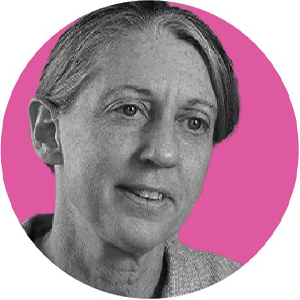
Margaret Plews-Ogan is the Brodie Professor of Medicine at the University of Virginia School of Medicine and former chief of the Division of General Medicine, Geriatrics, and Palliative Medicine. She is on the board of IAmALS, an ALS advocacy organization. She is a co-author of Choosing Wisdom: Strategies and Inspiration for Growing through Life-Changing Difficulties.
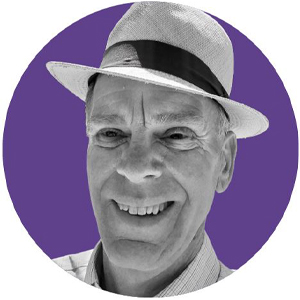
James Plews-Ogan is the Emeritus Associate Professor of Pediatrics at the University of Virginia School of Medicine. A pediatrician for 40 years, Jim has published articles on the care of children with medical complexity and disability. Jim’s blog, Offering Kindness, started as a way to give voice to families facing medical complexity and disability. Now, the blog reflects Jim’s journey with ALS.
Spring 2024
Part I: Pursuing Virtue
L. Gregory Jones
Sabrina B. Little
Kelli Reagan Hickey
Jesse S. Summers
Interlude: Purposeful Pursuits
Howard Gardner
Part II: Pursuing Vocation
Clayton Spencer
James Coleman, Jr.
James and Margaret Plews-Ogan
Carolyn Woo
MORE





